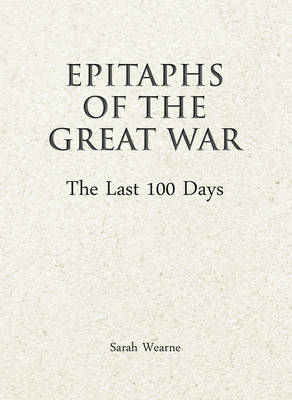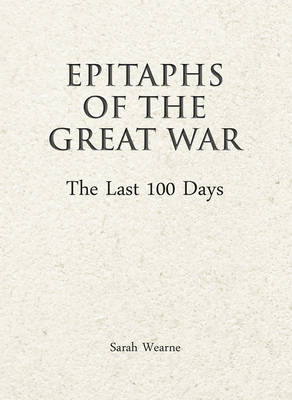
- Afhalen na 1 uur in een winkel met voorraad
- Gratis thuislevering in België vanaf € 30
- Ruim aanbod met 7 miljoen producten
- Afhalen na 1 uur in een winkel met voorraad
- Gratis thuislevering in België vanaf € 30
- Ruim aanbod met 7 miljoen producten
Zoeken
Omschrijving
Epitaphs of the Great War: The Last 100 Days is the third instalment in a collection that presents headstone inscriptions from the graves of soldiers killed during World War I. Limited by the Imperial War Graves Commission to sixty-six characters, these inscriptions are masterpieces of compact emotion containing as they do the distilled essence of thousands of responses to the war. Their enforced brevity, however, means that many inscriptions relied on the reader being able to pick up on very brief references, allusions, and quotations that would likely elude contemporary readers. In this selection of one hundred inscriptions from the battlefield cemeteries, historian Sarah Wearne presents the inscriptions with supporting contextual information--religious, literary, or personal--to enable us for the first time in a century to truly hear the voices of the bereaved. This volume is perhaps the most tragic of the set, presenting epitaphs for those killed in France and Flanders during the period commonly known as the last hundred days of the war, a period from August 8 to November 11, 1918, a time when the end was clearly in sight, yet men continued to fight and die.
Specificaties
Betrokkenen
- Auteur(s):
- Uitgeverij:
Inhoud
- Aantal bladzijden:
- 132
- Taal:
- Engels
- Reeks:
Eigenschappen
- Productcode (EAN):
- 9781911604624
- Verschijningsdatum:
- 15/03/2019
- Uitvoering:
- Hardcover
- Formaat:
- Genaaid
- Afmetingen:
- 127 mm x 183 mm
- Gewicht:
- 612 g

Alleen bij Standaard Boekhandel
+ 30 punten op je klantenkaart van Standaard Boekhandel
Beoordelingen
We publiceren alleen reviews die voldoen aan de voorwaarden voor reviews. Bekijk onze voorwaarden voor reviews.











